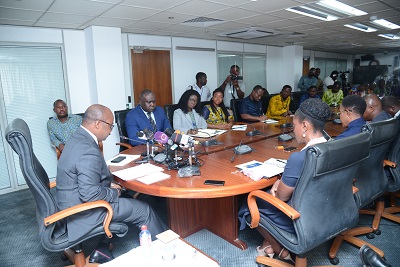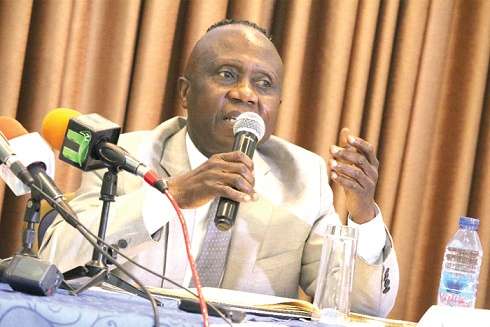The Institute of Economic Affairs (IEA) has recommended a mixed or hybrid approach for managing inflation in Ghana because of the strong supply and cost undercurrents.
According to the IEA, the new approach requires the Bank of Ghana (BoG) and Government working together rather than in separate silos or pigeon holes as is been done currently, to find a lasting solution to inflation persistence in Ghana.
“To deal with inflation over the long-term, we suggest a mixed or hybrid approach. This is a combination of the IT approach—which, for want of a better name, we call the macro-approach to the extent that it targets the entire headline inflation—with an approach that directly targets the persistent supply or cost components of the CPI, which we refer to as the micro-approach”.
IEA
Ghana is experiencing its share of the inflation crisis that has engulfed the whole world as a result of Covid-19 and the Russia-Ukraine. Inflation has risen consistently every month in the past year to reach an 18-year high of 27.6% in May.
Almost every consumer item has been affected and, with wages and most incomes being almost stagnant, Ghanaians are experiencing untold economic hardship, the IEA indicated.
So far, the Bank of Ghana has responded quite aggressively by raising the Policy Rate (PR) cumulatively by 550 basis points in the past year to 19.0% in May. However, the IEA stated that the strong policy tightening has not been able to contain the inflation.
“Mitigating the current inflation calls for interventions in respect of food and fuel, especially. For food, it is necessary to augment supply, including from accessing the ECOWAS strategic stock, importing some food items and banning exportation of essential items.
“Further, the Government should consider providing a temporary subsidy on staples like maize, rice and bread to ease the burden on low-income consumers. Even the IMF, which is known not to be a fan of subsidies, has called on Governments to provide food subsidies to their citizens”.
IEA
Reducing prices at the pump
For fuel, the IEA called on Government to try to cushion pump prices, including from its own windfall earnings from higher oil prices, the Energy Sector Stabilization Levy Act (ESLA) fund, or reduction of some of the taxes and levies.
Meanwhile, the BoG may still have to keep monetary policy tight, as necessary, to dampen potential demand pressures from fiscal policy impulses as well as counter second-round effects that could emanate from the supply shocks, the IEA stated.

Ghana has a history of high inflation compared to our peers in Africa and elsewhere. In the eighties and nineties, inflation was in the high double digits. Over the last twenty years, however, inflation has declined significantly along with improvement in general macroeconomic performance. However, “we have not resolved the problem completely”, the IEA emphasized.
The IEA noted in a statement that, all this while, the BoG has been struggling to keep inflation at single digits at a time when inflation had been tamed globally.
Empirical evidence identifies over-expansionary fiscal policies, food supply deficits and exchange rate volatilities as some of the key drivers of Ghana’s inflation. Also, occasional oil price shocks, coupled with the multiple taxes and levies in the domestic price build-up, fuel inflation from time to time.
The Inflation Targeting (IT) framework
The BoG adopted the Inflation Targeting (IT) framework in 2007, which uses the Policy Rate (PR) that it charges on loans to banks to influence interest rates banks charge on various loans to consumers so as to induce them to purchase less goods and services and thereby, bring down prices in the economy.

However, the IEA stated that the snag with the IT is that because Ghana’s financial system is less developed, financial products are limited and financial inclusion is low, the transmission of the PR is constrained, as is its potential to influence consumer behavior and inflation.
“IT is further limited in the Ghanaian context by the fact that, as we noted above, our inflation has strong supply and cost undercurrents that are less amenable to the PR, which is essentially a demand-management tool.
“In view of these limitations, using IT solely to control inflation can be counterproductive as it can inflict harm on the real sector. Also, in Ghana where wages, incomes, and aggregate demand are low, and most people live from hand to mouth, to attempt to squeeze demand further through the IT framework can exacerbate economic hardship”.
IEA
As such, the IEA recommended some specific policies in support of the IT framework. These include: Ensuring adequate food access and affordability; Ensuring sustainable supply of fuel and avoid extreme price volatilities; Improving access and availability of public transport; as well as Reducing exchange rate volatilities.
The Policy Think Tank also urged government to reduce the destabilizing effect of fiscal policy by entrenching fiscal discipline through revenue-enhancing and expenditure-rationalization measures in addition to reducing borrowing and debt accumulation.
“…We wish to emphasize that what we are proposing is a pragmatic rather than an ideological approach to resolving what has become a perennial national problem. What we all want is what works for Ghana. Further, it is important that we refrain from operating in silos or pigeon holes, as that would not work for us”.
IEA
The IEA emphasized that BoG and Government should work together to achieve the common national goal of finding a durable solution to Ghana’s inflation persistence.
READ ALSO: Police Notice, A Deliberate Attempt To Frustrate Preparations Made- Arise Ghana Executive




















